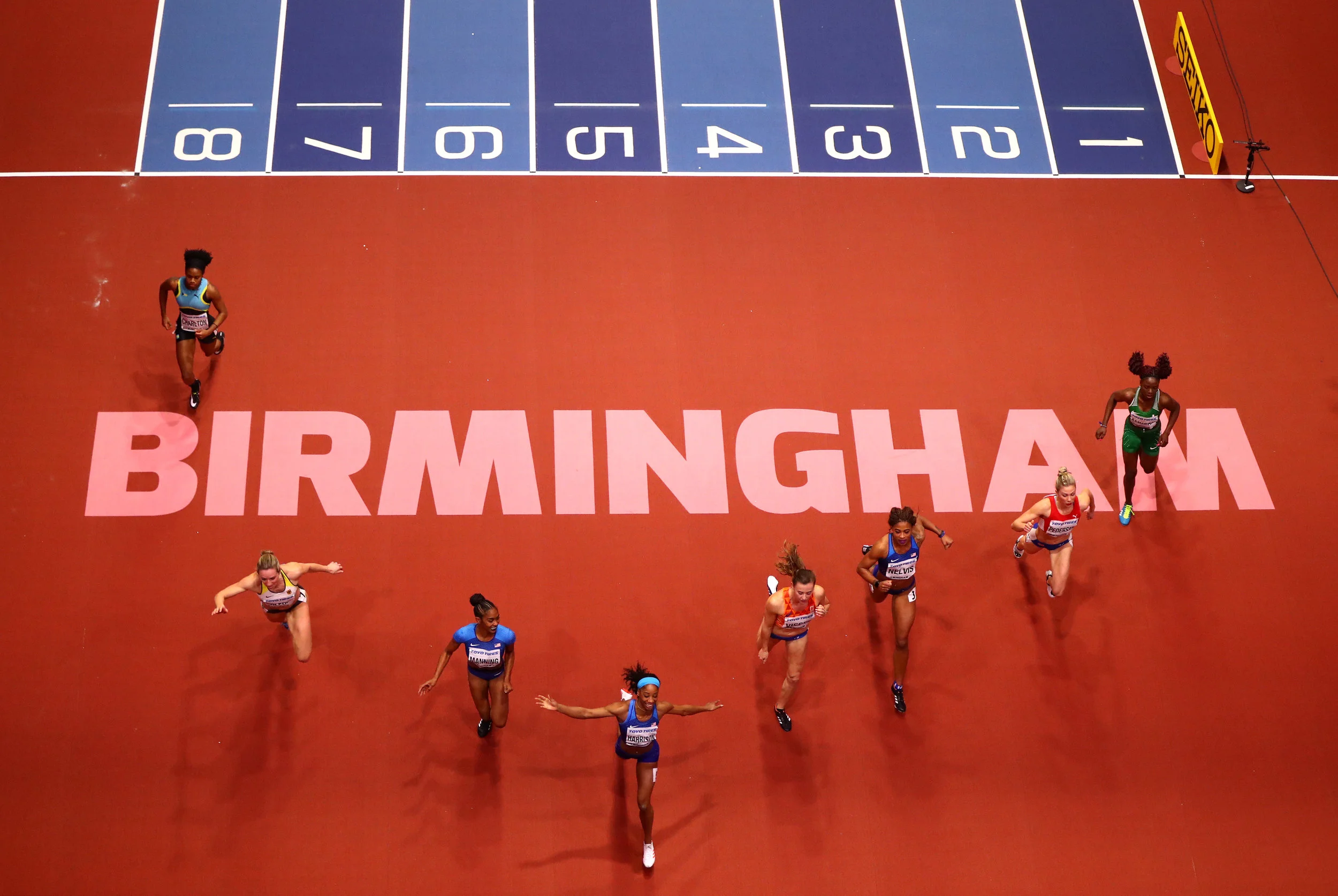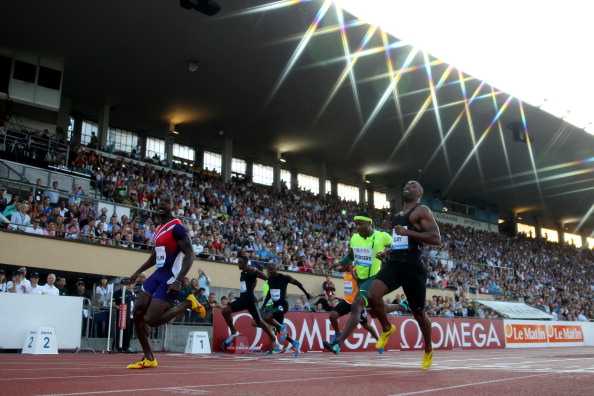Distance running is a hard, lonely affair. The tell is the last kilometer. The crucible is the last lap.
In our time, one man has emerged -- from among the Kenyans, the Ethiopians, the Eritreans -- to dominate, truly dominate, track's two distance events, the 5,000 and the 10,000 meters. He is Mo Farah, a global citizen who was born in Somalia, trains in Oregon, runs for Great Britain.
Farah won the 5,000 meters Friday night at Moscow's Luzhniki Stadium by the narrowest of margins, crossing in 13:26.98. In so doing, he won not just a double-double but has now performed an amazing double double-double.
That is -- he won both the 5 and 10k here in Moscow. At last year's London Olympics, he won both the 5 and 10k as well. At the 2011 worlds in Daegu, South Korea, Farah won the 5k; he lost the 10k by 26-hundredths of a second to Ibrahim Jeilan of Ethiopia, whom he beat in this year's 10k by two steps.
Only Kenenisa Bekele of Ethiopia has done the worlds double, in 2009. Bekele also doubled up at the 2008 Beijing Games. And the word "legendary" is typically attached to Bekele now as if it were his first name instead of Kenenisa.

"It was a lot harder work than last year." Farah said afterward. "I never thought in my career that I'd achieve something like this."
The finish of Friday's 5k was so fantastic that it was, genuinely, an instant classic.
Hagos Gebrhiwet of Ethiopia finished second, Isiah Kiplangat Koech of Kenya third. Both were timed in 13:27.26. They had to go to the thousandths to separate them: Gebrhiwet crossed, the clock said, in 13:27.259, Koech in 13:27.260.
It couldn't get any closer.
Of course, for track freaks it made for a sort of holy grail. But for anyone who appreciates will and effort, it shows why track can still claim such a powerful hold on the imagination -- and why, despite the malevolent ill of doping that has corrupted so much in the sport over the past several years, a race like Friday's 5k and its finish offers such tangible evidence of what it can still be all about.
It's three guys pushing themselves, to their limits, to get to the finish line first. Who wants it most?
Of course, this all assumes -- and there is no, repeat no, evidence to date -- that Farah is guilty of anything other than being very, very good.
With that caveat:
With three laps to go in the race, Farah went to the front. The others in the race lined up behind, among them his training partner, the American Galen Rupp, the silver medalist in the 10k in London.
A little math, for those unfamiliar with the 5k on the track.
A track is of course 400 meters. The 5000 -- this is fourth-grade math, but just to make it easy -- is 12 and one-half laps.
The races tend to start slow but then pick up toward the end. That, too, is only sensible.
A little more math, for reference:
The best 400-meter runners, like the American LaShawn Merritt, run championship races in about 44 seconds. A truly exceptional 400 winner goes 43-something.
What happens in the 5 and 10k is that after lap after numbing lap, the body starts screaming, "Stop - this hurts, and bad." That, though, is precisely when the best distance guys have to turn on the jets and run a last kilometer of about 2:20-something and a last lap of roughly 51 to 53 something. Anything less -- no chance.
In Farah's winning 10k in Moscow, he needed a 2:26.23 final kilometer to hold off Jeilan.
In Friday's 5k, he ran a 2:22.29 last kilometer. That is simply flying.
His last 800: about 1:51.
Last 600: 1:21.93.
Last lap: 53.51.
The difference between first and third in Friday's 5k, 28-hundredths of a second, is the smallest-ever in a world championships. The previous smallest differential: 33-hundredths, at the 2003 worlds in Paris.
Rupp finished eighth, in 13:29.87.
Farah also said this: "Anything is possible, I guess."
In other action Friday, Jamaica's Shelly-Ann Fraser-Pryce also doubled up, winning the women's 200 meters to go with the 100 she won Monday.
She became the first winner of the women's sprint double since 1991.
Fraser-Pryce made it look like a breeze: 22.17.
Murielle Ahoure of the Ivory Coast, the silver medalist in the 100, took second in the 200, too, in 22.32. They had to go to the thousandths in the women's 100 as well; Ahoure was timed in 22.313.
Blessing Okagbare of Nigeria, who is also having a fantastic meet, took third, also in 22.32; precisely, 22.319. Okagbare won silver in the long jump on Sunday behind American Brittney Reese, with a jump of 6.99 meters, or 22 feet, 11-1/4 inches. On Monday, she ran sixth in the 100, finishing in 11.04.
American Allyson Felix, going for a record fourth world title in the 200, didn't make it out of the curve, crumpling to the track, holding the back of her leg. She was carried off by her brother, Wes, who is also her manager; an ultrasound revealed a tear of her right medial hamstring, USA Track & Field announced.
She said later she was "extremely devastated" but in classic Allyson Felix form took the time and effort to nonetheless wish "all of my teammates the best for the rest of the meet."
The U.S. men's 4x400 relay won -- and the only drama was whether there would be a dropped baton.
There was not.
David Verburg ran a 44.37 to open things up. Tony McQuay, the 400 silver medalist, split a 44.68. Arman Hall ran 44.92. Merritt, the 400 gold medalist, ran 44.74 to close things down, and the Americans won by more than a second, finishing in 2:58.71, 2013's best time.
Jamaica took second, 2:59.88, Russia third, 2:59.9.
For Hall, it was his fifth world championship medal in three years -- 2011 world youth 400 and sprint medley relay champion, 2012 world junior 400 champ and 4x400 relay and, now, his first senior title.
The United States, minus Merritt, took silver in London last year.
Germany's David Storl defended his shot-put title with a throw of 21.73 meters, or 71-3 1/2, the first back-to-back winner since American John Godina in the mid-1990s. To celebrate, he put on a silly hat.
American Ryan Whiting came in second at 21.57, or 70-9 1/4.
Canada's Dylan Armstrong, with a throw of 21.34, or 70 1/4, got third. That medal is Canada's fourth, its best-ever total at a worlds.
In the men's long jump, American Dwight Phillips, 35 years old, the 2004 Athens Games gold medalist, four times a world champion -- most recently in 2011 -- had hoped Moscow would produce one final leap for the record books.
It was not to be.
The oldest man ever to jump in the final of a world championships, Phillips jumped 7.88 meters, or 25-10 1/4, on his third attempt. But he did not advance, and finished 11th.
"Today I gave everything I had, and it just wasn't enough," Phillips said. "Obviously I was looking for that storybook ending but I'm so proud of myself."
In the men's 200, Usain Bolt ran a 20.66 in the first round, 20.12 in the semifinals. The finals go down Saturday.
The heats of the women's 100-meter hurdles got underway with American sensation Brianna Rollins qualifying in 12.55.
Australia's Sally Pearson, the 2012 Games gold medalist, served notice that she may be -- finally in 2013 -- ready to rock with a season-best 12.62. Dawn Harper, the London silver medalist and 2008 Beijing gold medalist, got through easily in 12.84.
The 100 hurdles semifinals and finals are also set for Saturday.






